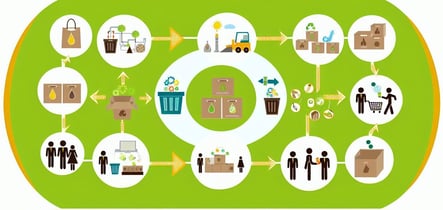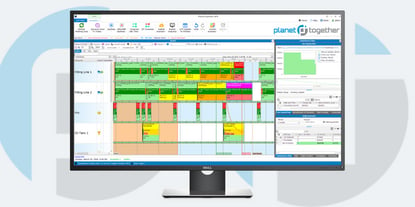Life Cycle Assessment (LCA)
As consumers increasingly prioritize eco-conscious products, companies are under pressure to not only deliver quality goods but also to minimize their environmental footprint. This imperative extends to every aspect of the supply chain, from sourcing raw materials to packaging and distribution.
Purchasing managers play a pivotal role in this endeavor, tasked with sourcing materials and services that align with the company's sustainability goals while ensuring efficiency and cost-effectiveness. One powerful tool at their disposal is Life Cycle Assessment (LCA), a comprehensive methodology for evaluating the environmental impacts of products throughout their entire life cycle.
In this blog, we'll look into the significance of LCA in product design within the food and beverage manufacturing sector, exploring its benefits, challenges, and the crucial role it plays in driving sustainable practices. Furthermore, we'll discuss how integrating LCA into existing enterprise resource planning (ERP), supply chain management (SCM), and manufacturing execution systems (MES) can amplify its effectiveness, with a particular focus on integration with PlanetTogether and leading ERP systems like SAP, Oracle, Microsoft, Kinaxis, and Aveva.

Understanding Life Cycle Assessment (LCA)
Life Cycle Assessment is a systematic approach used to quantify and evaluate the environmental impacts of a product or service throughout its entire life cycle—from raw material extraction and production to use, disposal, and beyond. It considers various environmental indicators such as energy consumption, greenhouse gas emissions, water usage, and waste generation.
The LCA process typically involves four key stages:
- Goal and Scope Definition: Identifying the purpose of the assessment, defining the boundaries of the study, and determining which environmental impact categories to assess.
- Life Cycle Inventory (LCI): Compiling data on all inputs (e.g., materials, energy) and outputs (e.g., emissions, waste) associated with each stage of the product life cycle.
- Life Cycle Impact Assessment (LCIA): Evaluating the potential environmental impacts based on the LCI data, often using impact assessment methodologies and environmental indicators.
- Interpretation: Analyzing the results, drawing conclusions, and identifying opportunities for improvement.

The Importance of LCA in Product Design
In the food and beverage industry, where sustainability and resource efficiency are paramount, integrating LCA into product design processes offers several key advantages:
Identifying Hotspots and Opportunities for Improvement: LCA enables companies to pinpoint the stages of a product's life cycle that have the greatest environmental impact, allowing them to prioritize efforts for improvement. Whether it's reducing energy consumption during manufacturing, minimizing packaging waste, or sourcing ingredients from more sustainable suppliers, LCA provides valuable insights for optimization.
Informing Design Decisions: By considering environmental factors from the outset of product development, companies can make more informed design decisions. This may involve selecting materials with lower environmental footprints, optimizing packaging to reduce material usage, or designing products for ease of recycling or composting.
Meeting Regulatory Requirements and Customer Expectations: With increasing regulatory scrutiny and consumer demand for sustainable products, companies that embrace LCA in product design gain a competitive edge. By proactively addressing environmental concerns and demonstrating a commitment to sustainability, businesses can enhance their brand reputation and market appeal.
Driving Innovation and Collaboration: LCA encourages innovation and collaboration across the supply chain. By engaging suppliers, manufacturers, and other stakeholders in sustainability initiatives, companies can explore new technologies, processes, and materials that minimize environmental impacts while maintaining quality and cost-effectiveness.
Challenges and Considerations
While the benefits of LCA in product design are clear, implementing and integrating this methodology into existing processes poses certain challenges:
Data Availability and Quality: Gathering accurate and comprehensive data for LCA can be challenging, particularly when dealing with complex supply chains and multiple stakeholders. Ensuring data consistency, reliability, and transparency is essential for meaningful LCA results.
Complexity and Time Requirements: Conducting a thorough LCA requires time, expertise, and resources. From data collection and analysis to interpretation and decision-making, the LCA process can be complex and resource-intensive, particularly for companies with diverse product portfolios and global operations.
Integration with Existing Systems: Integrating LCA into existing ERP, SCM, and MES systems can be a daunting task, especially considering the diverse software platforms and data formats used across different departments and functions. Seamless integration is crucial for streamlining data exchange, automating processes, and leveraging LCA insights for decision support.

Integration of LCA with ERP, SCM, and MES Systems
To overcome the challenges associated with LCA implementation and maximize its effectiveness, integrating LCA into existing enterprise systems is essential. This integration enables seamless data exchange, real-time visibility, and enhanced decision-making capabilities across the organization.
PlanetTogether, a leading production planning and scheduling software, offers robust integration capabilities with major ERP systems such as SAP, Oracle, Microsoft Dynamics, Kinaxis, and Aveva. By integrating PlanetTogether with these ERP systems, food and beverage manufacturers can leverage LCA data to optimize production schedules, resource allocation, and inventory management in alignment with sustainability objectives.
Benefits of Integration
Real-Time Data Visibility: Integration between PlanetTogether and ERP systems enables real-time access to LCA data, allowing planners and decision-makers to incorporate environmental considerations directly into production planning and scheduling processes.
Optimized Resource Allocation: By integrating LCA data with production planning algorithms, companies can optimize resource allocation based on environmental impact criteria, such as energy consumption, emissions, or water usage. This ensures that production schedules are aligned with sustainability goals while maximizing efficiency and minimizing waste.
Enhanced Decision Support: Integrated ERP and LCA data provide decision-makers with comprehensive insights into the environmental implications of various production scenarios. This enables informed decision-making, such as selecting suppliers with lower carbon footprints, optimizing transportation routes to reduce emissions, or adjusting production volumes based on seasonal fluctuations in resource availability.
Compliance and Reporting: Integration facilitates seamless reporting and compliance monitoring, enabling companies to track and report on environmental performance metrics, meet regulatory requirements, and demonstrate adherence to sustainability commitments.
In an era of increasing environmental awareness and regulatory scrutiny, Life Cycle Assessment (LCA) has emerged as a powerful tool for driving sustainability in food and beverage manufacturing. By systematically evaluating the environmental impacts of products throughout their entire life cycle, companies can identify opportunities for improvement, inform design decisions, and meet evolving consumer expectations.
Integration of LCA with existing ERP, SCM, and MES systems, such as PlanetTogether and leading platforms like SAP, Oracle, Microsoft Dynamics, Kinaxis, and Aveva, enhances the effectiveness of sustainability initiatives. By leveraging LCA data for production planning, resource allocation, and decision support, companies can optimize operations while minimizing their environmental footprint, ultimately achieving the dual objectives of sustainability and profitability in the food and beverage industry.
Are you ready to take your manufacturing operations to the next level? Contact us today to learn more about how PlanetTogether can help you achieve your goals and drive success in your industry.